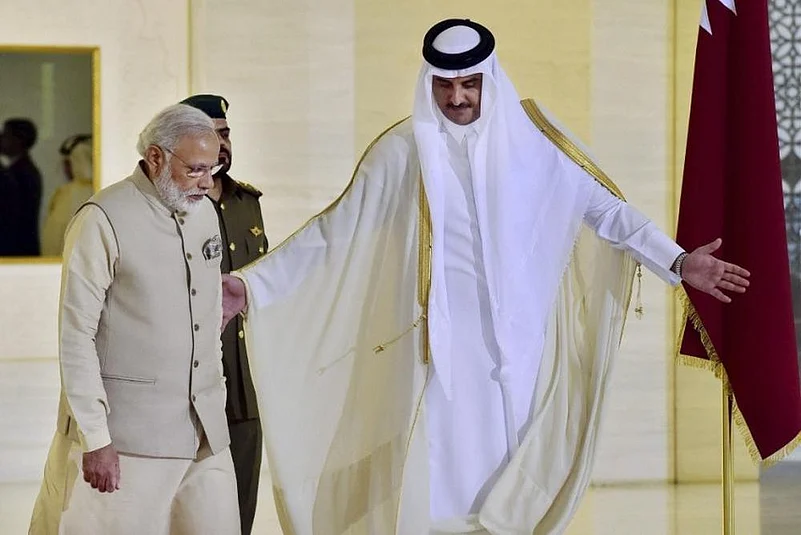On Monday Saudi Arabia, Bahrain, Egypt and UAE cut ties with Qatar, accusing it of destabilizing the region by supporting Islamist groups and regional rival Iran. The Gulf Nations cut off sea, land and air routes to Qatar.
Qatari nationals have been given 14 hours to leave UAE, Bahrain and Saudi Arabia; the aforementioned nations have also banned their own citizens from entering Qatar. Maldives joined the ban later as did the interim government of Libya and Yemen, leaving Kuwait and Oman as the only nations within the powerful Gulf Cooperation Council (GCC) to retain ties with Qatar.
The foreign ministry of Qatar has called these measures “unjustified” and based on “allegations that have no basis in fact.” Oil prices fell by more than 1% on Monday, due to concerns over the effects of this rift on a global deal to reduce oil production.
This is one of the worst diplomatic rifts among the Gulf nations. The measures are more stringent than those imposed during the 8-month split in 2014 when Bahrain, Saudi Arabia and UAE withdrew their ambassadors from Doha.
The crisis raises important questions for India -- 650,000 Indians live and work in Qatar, the largest expatriate community in this region. 65% of India’s LNG imports come from the Gulf Nation. Though the trade balance is in favour of Qatar, the last two years have seen Indian exports to Qatar grow to almost $1 billion. A number of Indian companies such as Tata Consultancy Services Ltd, Wipro, MahindraTech, Larsen & Toubro Limited operate in Qatar.
External Affairs Minister Sushma Swaraj termed the split an “intra-GCC issue”. “Our only concern is about Indians there. We are trying to find out if any Indians are stuck there,” she said.
Kerala chief minister Pinarayi Vijayan wrote to PM Narendra Modi and Sushma Swaraj on Monday, seeking the centres intervention to ensure the safety of 6.5 lakh Indians, including 3 lakh Keralites. He pledged the support of his state “to the considered stance that Union government would take on the issue, given the complexities involved”
Dr. S. Irudaya Rajan, Chair Professor, Ministry of Overseas Indian Affairs Research Unit on International Migration at the Centre for Development Studies in Thiruvananthapuram said that there was no reason for Indians in general and Keralites in particular to panic over the boycott of Qatar.
He argued that the diplomatic split might actually lead to short-term gains for Indian nationals.
“Indians could fill the jobs vacated by the citizens of these 6 nations. I think it would be an opportunity for Indians and expatriates from entire South Asia.”
He said, “As long as India didn’t send a notification of recall, Indians in Qatar need not worry.” However, Dr Rajan warned that the long-term impacts might be negative. Saudi Arabia has exhorted other nations to cut off ties and freeze investments in Qatar; if that happens it could have a negative impact on the job market.
Dr KN Raghavan, Chief Executive Officer of the Non-Resident Keralites’ Affairs Department, said that they had not received any panic calls from Keralites in Qatar or from those planning to fly to Qatar until yesterday.
The immediate worry for Indians is the impact on airline travel after organisations like Emirates closed down all flight services to and from Doha. Travelling from India to Qatar is unlikely to be affected as flights from India take the Persian Gulf Route. However, travelling within the region could become troublesome following the isolation of Qatar Airways (used by an estimated 24,000 Indians per week). The denial of airspace to Doha may require Indians travelling from Qatar to the UAE to re-route their flights.
In recent months Qatar Airways has shown an interest in setting up a domestic airline in India, however, it is unclear how these plans will be affected by recent developments, if they are.
LNG flows from Qatar to India haven’t seen any disruption yet. The managing director and Chief executive of Petronet LNG Ltd. Prabhat Singh said that the company’s imports hadn’t been affected. While the UAE cut off all vessels going to or coming from Qatar at the anchorage point off Fujairah, analysts have pointed out that this will not impact exports of Qatari LNG outside the Arab world.
India has built strong ties with both Qatar and Saudi Arabia; PM Narendra Modi visited Qatar and hosted Emir Al-Thani in Delhi last year. Modi has also focused on strengthening trade ties with KSA and UAE, visiting both nations in the past three years. Both KSA and UAE have cooperated with India on intelligence sharing and counter terrorism. Despite this, both these countries as well as Qatar have maintained links with extremist groups in Syria, Afghanistan and Iraq.
Until now, neither side has used India as leverage, while a deepening political crisis may lead to this outcome; its unlikely that India will be forced to take sides.
Countries across the world have encouraged dialogue and a peaceful solution. Commenting on the split, Russia said it wanted a “stable and peaceful” situation in the Gulf.
Turkish foreign Minister Mevlüt Çavuşoğlu said that dialogue must continue between the Arab nations and Qatar. Iran called for a resolution through dialogue and stated that heightened tension was not conducive to conflict resolution in the Middle East.
US Secretary of State Rex Tillerson urged the GCC nations to sort out their differences. He said “I do not expect that this will have any significant impact, if any impact at all, on the unified fight against terrorism in the region or globally.”

























